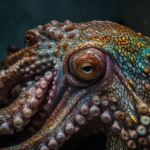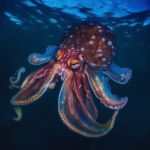Octopuses are fascinating creatures that inhabit the world’s oceans. With their unique appearance and remarkable abilities, they have captivated the curiosity of scientists and nature enthusiasts alike. One question that often arises when discussing octopuses is whether or not they have shells. Unlike other marine animals such as clams or snails, octopuses do not possess a hard outer shell. Instead, they have a soft body that allows them to squeeze through tight spaces and camouflage themselves in their surroundings. In this article, we will explore the anatomy of an octopus and delve into the reasons behind their lack of shells. So, let’s dive in and unravel the mysteries of these incredible cephalopods.
Key Takeaways
- Octopuses do not have shells.
- They have a soft body that allows them to squeeze through tight spaces.
- Their bodies are protected by a muscular mantle and a network of suckers on their arms.
- Octopuses rely on camouflage and jet propulsion to escape predators.
Understanding Octopuses: A Basic Overview
Octopuses are fascinating creatures that belong to the mollusk family, which also includes squids, cuttlefish, and snails. These invertebrates are known for their unique anatomy and remarkable abilities. One of the most distinctive features of octopuses is their lack of a shell, unlike many other mollusks. Let’s delve into the world of octopuses and explore why they don’t have shells.
The Soft-Bodied Octopus
Unlike their relatives, such as snails and clams, octopuses have evolved to be soft-bodied creatures. This means that their bodies are not protected by a hard outer shell. Instead, they rely on other adaptations to survive in their marine habitats.
Octopus Adaptations
The absence of a shell has allowed octopuses to develop a range of fascinating adaptations. One of the most remarkable adaptations is their ability to change color and texture to blend in with their surroundings. This incredible camouflage allows them to hide from predators and ambush their prey effectively.
Octopuses also have the ability to squeeze through incredibly small spaces due to their flexible bodies. This allows them to escape from tight spots or hide in crevices where predators cannot reach them.
Octopus Protection Strategies
While the lack of a shell may seem like a disadvantage, octopuses have evolved various strategies to protect themselves. In addition to their camouflage abilities, they can release a cloud of ink to confuse predators and make a quick escape. This ink cloud acts as a smokescreen, giving the octopus time to flee to safety.
Furthermore, octopuses have a remarkable ability to regenerate lost limbs. If an octopus is attacked and loses an arm, it can grow a new one to replace it. This regenerative ability helps them recover from injuries and defend themselves against predators.
Octopus Intelligence and Behavior
Octopuses are known for their high level of intelligence. They have complex nervous systems and large brains relative to their body size. This intelligence allows them to solve puzzles, remember past events, and exhibit problem-solving skills.
Octopuses are also highly curious creatures. They are known to explore their surroundings and interact with objects in their environment. Some octopuses have even been observed using tools, such as coconut shells, to create shelters for themselves.
Octopus Physiology
The absence of a shell has allowed octopuses to develop a unique physiology. Their bodies are incredibly flexible, allowing them to squeeze into tight spaces and maneuver through complex environments. Octopuses also have a beak-like mouth, which they use to capture and consume their prey.
Another interesting feature of octopuses is their ability to change the texture of their skin. They can create bumps, ridges, and even spikes to further enhance their camouflage abilities. This remarkable flexibility and adaptability make octopuses highly successful predators in their habitats.
In conclusion, octopuses are fascinating creatures that have adapted to life without a shell. Their soft bodies have allowed them to develop remarkable camouflage abilities, intelligence, and problem-solving skills. While they may lack the protection of a shell, octopuses have evolved various strategies to defend themselves against predators and thrive in their marine environments.
The Shell Conundrum: Do Octopuses Have Shells?
Octopuses are fascinating creatures that have captured the imagination of humans for centuries. With their unique appearance and remarkable abilities, they have become a subject of intrigue and wonder. One question that often arises when discussing octopuses is whether or not they have shells. In this section, we will delve into the world of octopus anatomy and explore the truth behind their shell conundrum.
The Soft-Bodied Octopus
Unlike their relatives, such as squids and cuttlefish, most octopus species do not possess an external shell. Instead, they have a soft and flexible body that allows them to squeeze through tight spaces and navigate their surroundings with ease. This lack of a protective shell sets them apart from other members of the mollusk family, which typically have hard outer coverings.
Internal Shell: A Remnant of Evolution
While most octopuses do not have an external shell, some species do possess a vestigial structure known as an internal shell or gladius. This internal shell is made of a lightweight material called chitin and serves as a support structure for the octopus’s body. However, it is important to note that this internal shell is not the same as the hard, protective shells found in other mollusks like clams or snails.
The presence of an internal shell in certain octopus species is believed to be a remnant of their evolutionary history. It is thought that their ancestors once had external shells but gradually lost them over time as they adapted to their changing environment. This adaptation allowed them to become more agile and maneuverable, enabling them to exploit new ecological niches.
Adaptations for Protection and Camouflage
Although octopuses lack a traditional shell, they have developed various adaptations to protect themselves from predators and blend into their surroundings. One of the most remarkable features of octopuses is their ability to change color and texture, allowing them to camouflage themselves effectively. By altering the pigments in their skin and manipulating their body shape, they can mimic their surroundings, making it difficult for predators to spot them.
In addition to camouflage, octopuses also have other defense mechanisms. Some species have specialized skin cells called chromatophores, which allow them to produce vibrant displays of color. These displays can be used to startle or confuse predators, giving the octopus an opportunity to escape. Octopuses can also release ink clouds, creating a smokescreen that further aids in their evasion tactics.
Octopus Habitat and Behavior
Octopuses are found in a wide range of marine habitats, from shallow coastal waters to the depths of the ocean. They are highly adaptable creatures and can thrive in various environments, including coral reefs, rocky shores, and sandy seabeds. Their ability to camouflage and their exceptional problem-solving skills make them well-suited to their diverse habitats.
Octopuses are known for their intelligence and complex behavior. They have been observed using tools, solving puzzles, and even displaying signs of playfulness. Their ability to learn and remember tasks has astounded scientists and has led to further research into their cognitive abilities.
The Shell-Less Octopus: A Marvel of Adaptation
In conclusion, while most octopuses do not have shells, they have evolved a remarkable set of adaptations to compensate for this absence. Their soft-bodied nature allows them to be incredibly agile and flexible, enabling them to navigate their surroundings with ease. Through their ability to change color and texture, they can camouflage themselves effectively, making them masters of disguise. Their intelligence and problem-solving skills further contribute to their survival in the marine world.
So, the next time you encounter an octopus, remember that their lack of a shell is not a disadvantage but rather a marvel of adaptation. These incredible creatures have found unique ways to thrive in their environment, showcasing the wonders of evolution and the diversity of life in our oceans.
The Evolutionary Tale: Did Octopuses Once Have Shells?
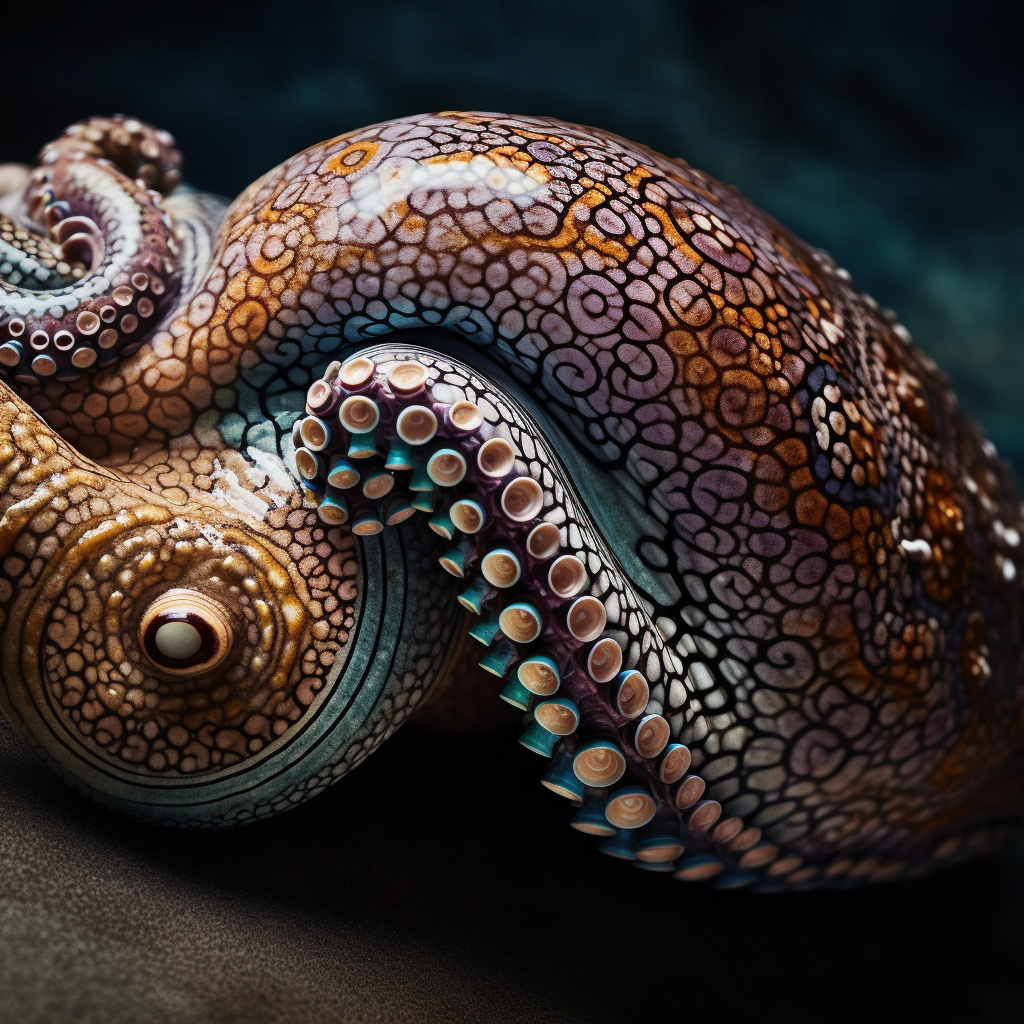
Octopuses are fascinating creatures that belong to the mollusk family, which also includes other marine animals like squids and cuttlefish. While many mollusks have shells to protect their soft bodies, octopuses are unique in that they are shell-less. However, this wasn’t always the case. The evolutionary history of octopuses tells a tale of adaptation and survival.
Octopus Anatomy and Evolution
To understand why octopuses no longer have shells, it’s important to delve into their anatomy and evolution. Octopuses are invertebrates, meaning they lack a backbone. Their bodies are soft and flexible, allowing them to squeeze through tight spaces and camouflage themselves in their surroundings.
In the past, octopuses did have shells, but over time, they evolved to lose them. This adaptation allowed them to become more agile and better suited to their environment. The absence of a shell enables octopuses to change shape and squeeze through small crevices, giving them an advantage when it comes to finding food and avoiding predators.
The Benefits of Being Shell-less
Being shell-less provides octopuses with several advantages. One of the most significant benefits is their ability to camouflage themselves. Octopuses are masters of disguise, capable of changing the color and texture of their skin to blend seamlessly with their surroundings. Without a shell, they can alter their body shape to mimic rocks, plants, or even other animals, making them virtually invisible to predators.
Another advantage of being shell-less is the ability to move quickly. Octopuses have a unique way of propelling themselves through the water. By expelling water from their bodies, they can jet forward and maneuver with precision. This rapid movement allows them to escape from potential threats and catch prey more efficiently.
Octopus Adaptations and Survival Strategies
In the absence of a protective shell, octopuses have developed various adaptations to survive in their habitat. One notable adaptation is their intelligence. Octopuses are highly intelligent creatures, capable of problem-solving and learning from their experiences. This intelligence helps them navigate their environment and find creative solutions to challenges they encounter.
Octopuses also have remarkable physiology. They possess a complex nervous system that allows them to process information and respond quickly to stimuli. Their arms, equipped with suckers, are incredibly dexterous and can manipulate objects with precision. These adaptations contribute to their survival and make them formidable predators in the ocean.
The Nautilus Connection
While octopuses have lost their shells, there is one living cephalopod that still retains this protective structure: the nautilus. Nautiluses are ancient creatures that have changed little over millions of years. They have external shells that provide them with protection and buoyancy.
The nautilus and octopus share a common ancestor, but their evolutionary paths diverged. The nautilus continued to rely on its shell for protection, while the octopus evolved to become shell-less. This divergence highlights the adaptability and versatility of the octopus, allowing it to thrive in a variety of marine environments.
The Fascinating World of Octopuses
Octopuses are truly remarkable creatures. Their evolution from having shells to being shell-less showcases the incredible adaptability and survival strategies of these intelligent invertebrates. By shedding their shells, octopuses gained the ability to camouflage, move swiftly, and develop complex behaviors.
Next time you encounter an octopus, take a moment to appreciate its unique anatomy and the evolutionary journey it has undertaken. These fascinating creatures serve as a reminder of the diverse and awe-inspiring wonders that exist beneath the surface of our oceans.
Octopuses and Shellfish: A Complex Relationship
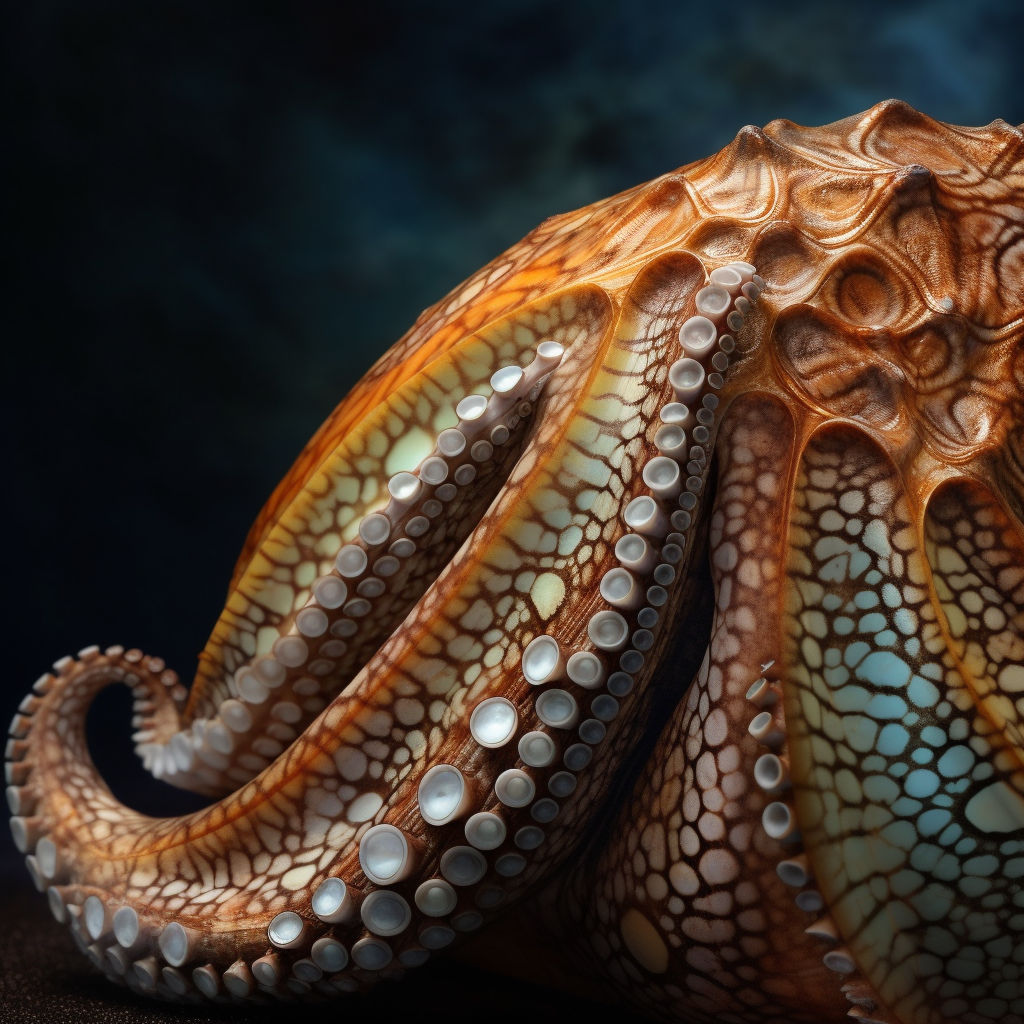
Octopuses and shellfish have a fascinating and complex relationship in the underwater world. While shellfish, such as clams, mussels, and oysters, rely on their hard shells for protection, octopuses have evolved to be soft-bodied creatures without any external shell. This difference in anatomy has led to unique adaptations and behaviors in both octopuses and shellfish.
Octopuses: The Shell-less Wonders
Octopuses belong to the mollusk family, which also includes other fascinating creatures like squids and cuttlefish. Unlike their relatives, octopuses lack an external shell. Instead, they have a muscular mantle that encloses their internal organs. This soft-bodied nature allows them to squeeze into tight spaces and maneuver through intricate coral reefs and crevices.
The absence of a shell has also given octopuses the ability to rapidly change their shape and color, making them masters of camouflage. They can blend seamlessly with their surroundings, whether it be a sandy seabed or a rocky reef. This incredible adaptation helps them hide from predators and ambush unsuspecting prey.
Shellfish: Nature’s Armor
On the other hand, shellfish have evolved to develop hard shells that provide them with protection against predators and the harsh underwater environment. These shells are made of calcium carbonate and are secreted by the mantle of the shellfish. The shells come in various shapes and sizes, depending on the species.
Shellfish use their shells as a form of armor, shielding them from potential threats. When danger approaches, they can retreat into their shells, closing the opening with their strong muscles. This defense mechanism helps them survive in the face of predators like crabs, fish, and even some octopus species.
The Octopus and Shellfish Interaction
Despite their contrasting physical attributes, octopuses and shellfish often share the same habitat. Octopuses are known to be opportunistic hunters, and shellfish make up a significant portion of their diet. The soft-bodied octopuses use their intelligence and dexterity to pry open the shells of clams, mussels, and other shellfish using their strong arms and beak-like mouth.
Interestingly, some octopus species have developed specialized adaptations to tackle shellfish with ease. For example, the veined octopus has been observed using coconut shells as portable shelters. They carry these shells with them and use them as tools to protect themselves and to trap unsuspecting prey.
A Constant Battle of Adaptation
The relationship between octopuses and shellfish is a constant battle of adaptation. As octopuses evolve new strategies to access shellfish, shellfish, in turn, develop stronger shells and more effective defense mechanisms. This ongoing evolutionary arms race has shaped the behavior and physiology of both octopuses and shellfish.
In conclusion, while octopuses do not have shells, they have evolved remarkable abilities to thrive in their shellfish-rich habitats. Their soft bodies and incredible intelligence allow them to overcome the challenges posed by their armored prey. The complex relationship between octopuses and shellfish showcases the wonders of nature’s adaptations and the intricate balance of life in the ocean.
The Habitual Patterns: Do Octopuses Stay in the Same Area?
Octopuses, with their intriguing anatomy and fascinating behavior, have captivated the curiosity of scientists and nature enthusiasts alike. One question that often arises is whether these enigmatic creatures stay in the same area or if they have habitual patterns of movement. Let’s delve into the world of octopuses and explore their tendencies when it comes to their habitat.
Octopus Habitat: The Vast Ocean Awaits
Octopuses are marine animals that belong to the mollusk family, which also includes squids and cuttlefish. Unlike their relatives, octopuses lack an external shell. Instead, they have a soft, muscular body that allows them to squeeze into tight spaces and maneuver with agility. This flexibility enables them to explore a wide range of habitats, from coral reefs to rocky crevices and sandy bottoms.
Adapting to a Shell-less Existence
While many mollusks rely on their shells for protection, octopuses have evolved to thrive without this external armor. Instead, they possess a remarkable ability to camouflage themselves, blending seamlessly with their surroundings. By changing the color and texture of their skin, octopuses can mimic the patterns of rocks, plants, and even other animals, providing them with a natural defense against predators.
Exploring New Frontiers: Octopus Movement
Octopuses are known for their intelligence and curiosity, which often leads them to explore new areas. They are not bound by territorial boundaries and can cover significant distances in search of food, mates, or suitable environments. Some octopus species have been observed migrating across vast stretches of the ocean, while others exhibit more localized movements, staying within a specific region.
The Role of Habitual Patterns
While octopuses may not adhere to strict territorial boundaries, they do exhibit habitual patterns in their movements. These patterns are influenced by factors such as food availability, reproductive cycles, and environmental conditions. For example, some octopuses may establish a home den where they retreat during rest periods or protect their eggs. They may return to this den repeatedly, creating a habitual pattern of movement within a certain area.
Flexibility and Adaptability
Octopuses are incredibly adaptable creatures, capable of adjusting their behavior and movement patterns based on changing circumstances. Their ability to squeeze through small openings and their exceptional problem-solving skills allow them to explore new territories and adapt to different environments. This flexibility ensures their survival and success in a constantly changing ocean ecosystem.
Unlocking the Mysteries of Octopus Movement
Despite our growing understanding of octopus behavior, there is still much to learn about their movement patterns. Scientists continue to study these intelligent creatures to unravel the mysteries of their habits and explore the factors that influence their movements. By gaining insights into octopus behavior, we can further appreciate the complexity and beauty of these remarkable creatures.
In conclusion, while octopuses do not have shells like other mollusks, they have evolved unique adaptations that allow them to thrive in a shell-less existence. Their movements are influenced by various factors, including food availability, reproductive cycles, and environmental conditions. While they may not adhere to strict territorial boundaries, octopuses exhibit habitual patterns in their movements, exploring new areas and adapting to different environments. By studying these behaviors, scientists can continue to unlock the secrets of octopus movement and gain a deeper understanding of these fascinating creatures. The Hard Shell Debate: Do Octopuses Have Hard Shells?
Octopuses are fascinating creatures that belong to the mollusk family, which also includes squids and cuttlefish. When we think of mollusks, we often picture animals with shells, like snails or clams. But what about octopuses? Do they have hard shells to protect their soft bodies? Let’s dive into the debate and explore the truth behind octopus anatomy and evolution.
The Soft-Bodied Octopus
Unlike their relatives, such as snails or clams, most octopus species do not have external shells. Instead, they have evolved to be soft-bodied creatures. This unique adaptation allows them to squeeze through tight spaces and hide in crevices, making them excellent escape artists.
Internal Shell: A Remnant of Evolution
While most octopuses lack external shells, some species do possess an internal shell, known as a “pen.” This pen is made of a flexible material called chitin and serves as a supportive structure. However, it is important to note that the pen is not a true shell like those found in other mollusks. It is more like a vestigial structure, a remnant of their evolutionary history.
Octopus Adaptations for Protection
Although octopuses lack hard shells, they have developed other remarkable adaptations to protect themselves from predators. One of their most impressive defense mechanisms is their ability to camouflage. Octopuses can change the color and texture of their skin to blend seamlessly with their surroundings, making them almost invisible to predators.
In addition to camouflage, octopuses have other defensive strategies. Some species can release ink clouds to confuse predators, while others can eject their arms, sacrificing them to escape from danger. These adaptations, combined with their intelligence and problem-solving abilities, make octopuses formidable opponents for would-be predators.
Octopus Habitat and Behavior
Octopuses are found in various marine habitats, including coral reefs, rocky shores, and the ocean floor. They are highly adaptable creatures, capable of surviving in both shallow and deep waters. Their ability to squeeze through small openings allows them to explore and inhabit a wide range of environments.
Octopuses are solitary animals and are known for their complex behaviors. They are skilled hunters, using their tentacles to catch prey such as crabs, fish, and even other mollusks. Their intelligence and problem-solving abilities have been the subject of numerous studies, revealing their remarkable cognitive capabilities.
The Nautilus Shell Connection
While octopuses do not possess shells like their distant relatives, the nautilus, they do share a common ancestor. The nautilus is a cephalopod that has a coiled external shell, providing it with protection. However, over millions of years, octopuses have diverged from this ancestral lineage, losing their shells and developing unique adaptations.
Unlocking the Mysteries of Octopus Intelligence
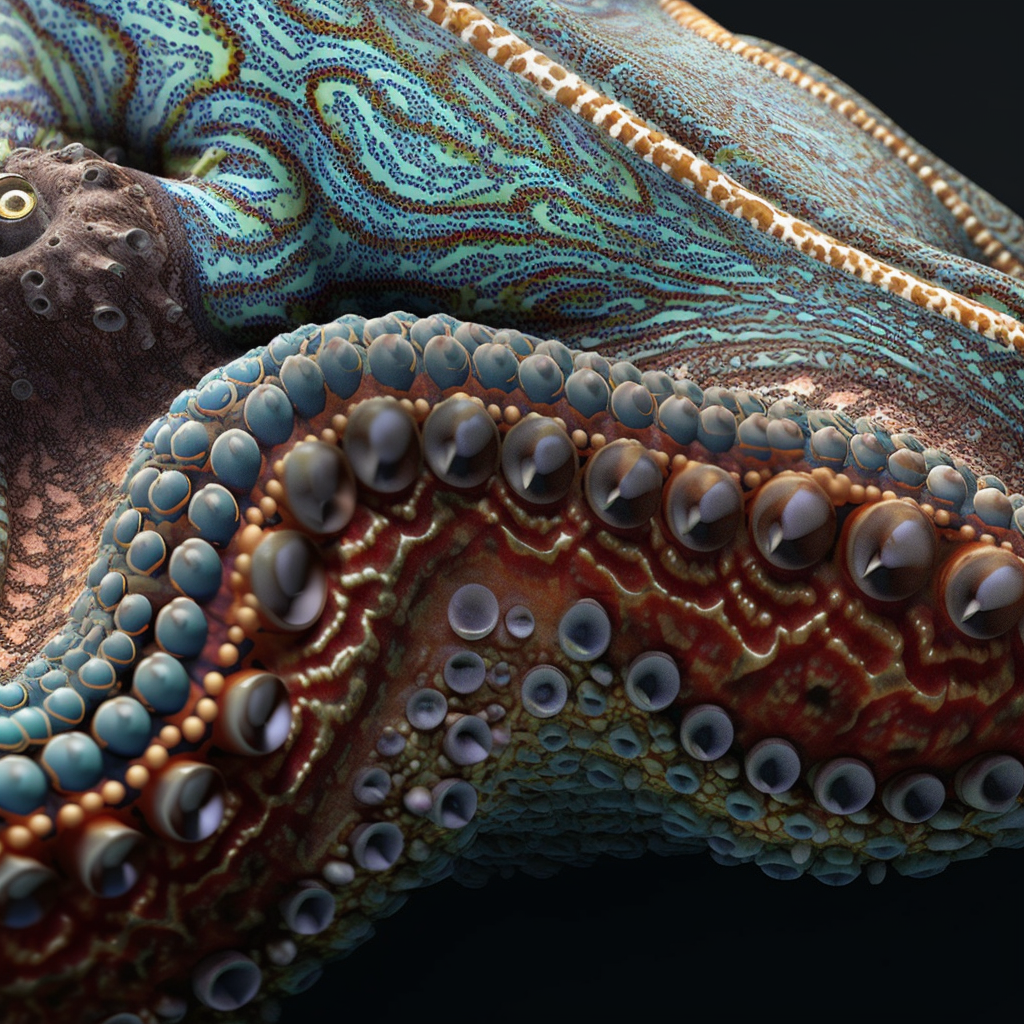
The absence of a hard shell in octopuses has allowed for the development of their extraordinary intelligence. Without the constraints of a protective shell, octopuses have evolved to be highly flexible and adaptable creatures. Their complex behaviors, problem-solving skills, and ability to learn from their environment have captivated scientists and researchers worldwide.
In conclusion, while octopuses do not have hard shells like other mollusks, they have evolved to be soft-bodied creatures with incredible adaptations. Their ability to camouflage, their intelligence, and their unique behaviors make them truly remarkable creatures of the sea. So, the next time you encounter an octopus, marvel at its soft body and appreciate the wonders of evolution that have shaped this incredible creature.
The Octopus Pie Characters: A Creative Interlude
The world of octopuses is a fascinating one, filled with a diverse range of species that captivate our imagination. While we may be familiar with their incredible ability to change color and shape, their intelligence, and their unique hunting techniques, one question that often arises is whether octopuses have shells. Let’s dive into this topic and explore the intriguing world of octopus anatomy.
The Soft-Bodied Wonders
Unlike their distant relatives, such as squids and cuttlefish, octopuses do not possess an external shell. Instead, they belong to a group of invertebrates known as cephalopods, which includes squids, cuttlefish, and nautiluses. These creatures have evolved in different ways, each adapting to their specific environments.
Adaptations for Survival
Octopuses have developed various adaptations to thrive in their habitats. One of the most remarkable features is their ability to camouflage themselves by changing the color and texture of their skin. This remarkable skill allows them to blend seamlessly into their surroundings, providing them with a crucial advantage when it comes to hunting and avoiding predators.
The Evolutionary Advantage
The absence of a shell in octopuses provides them with a unique advantage. Without the encumbrance of a hard outer covering, they are incredibly flexible and agile. This allows them to squeeze into tight spaces and explore crevices that would be inaccessible to creatures with shells. Their soft bodies also enable them to move swiftly and silently, making them formidable hunters.
Internal Protection
While octopuses lack an external shell, some species do have a vestige of their mollusk ancestry in the form of an internal shell. This structure, known as the “gladius” or “pen,” is a stiff, flexible plate that provides support to the octopus’s body. It is located near the mantle, which is the muscular organ responsible for respiration and propulsion. The gladius is made of chitin, a tough, fibrous material found in the exoskeletons of insects and the beaks of squids.
The Many Faces of Octopuses
Octopuses come in a wide variety of shapes and sizes, with over 300 known species inhabiting oceans around the world. From the tiny blue-ringed octopus, known for its venomous bite, to the giant Pacific octopus, which can weigh up to 50 kilograms (110 pounds), each species has its own unique characteristics and adaptations.
Intelligence and Behavior
Octopuses are renowned for their remarkable intelligence. They have complex nervous systems and are capable of problem-solving, learning, and even exhibiting playful behavior. Their ability to manipulate objects and solve puzzles has astounded scientists and led to comparisons with some of the most intelligent creatures on Earth.
A World Without Shells
In the vast oceanic realm, octopuses have thrived without the need for shells. Their soft bodies and incredible adaptability have allowed them to conquer a wide range of habitats, from coral reefs to the deep sea. By shedding the constraints of a shell, octopuses have evolved into masters of disguise, capable of blending seamlessly into their surroundings and outsmarting their predators.
In conclusion, while octopuses do not possess shells like other mollusks, their soft-bodied nature and remarkable adaptations have allowed them to flourish in the marine world. Their ability to change color, their intelligence, and their unique hunting techniques make them truly extraordinary creatures. So, the next time you encounter an octopus, marvel at its soft-bodied wonder and appreciate the incredible diversity of life in our oceans.
Conclusion
In conclusion, octopuses do not have shells. Unlike other mollusks such as snails and clams, octopuses have evolved to be shell-less creatures. Instead of relying on a protective external shell, octopuses have developed other remarkable adaptations to survive in their marine environments. Their soft bodies allow them to squeeze into tight spaces and camouflage themselves with their surroundings. They also have the ability to regenerate lost limbs, which is a unique feature among marine animals. Octopuses are truly fascinating creatures, and their lack of shells is just one of the many intriguing aspects of their biology.
Frequently Asked Questions
Do squids have shells?
Yes, squids do have shells, but they are internal rather than external. This internal shell is also known as a pen, which aids in their buoyancy and provides a level of structural support.
Does octopus count as shellfish?
No, octopuses do not count as shellfish. While they are part of the mollusk family, they are considered cephalopods, not shellfish. Shellfish typically refer to aquatic animals that have a shell or shell-like exterior, such as clams, oysters, and lobsters.
Why do octopuses have shells?
Contrary to popular belief, most octopuses do not have shells. They are soft-bodied invertebrates. Some species of octopuses have a small internal shell structure, but most have completely lost their shell through the process of evolution.
Do octopuses drill holes in shells?
Yes, some species of octopuses are known to drill holes in shells, particularly when they are hunting for food. They use their beak and a chemical secretion to soften the shell and access the prey inside.
Did octopuses have shells?
Yes, ancestral octopuses had shells. Over time and through the process of evolution, most octopuses lost their external shells. This adaptation allowed them greater flexibility and mobility, aiding in both their hunting and evasion from predators.
Why do octopuses hide in shells?
Octopuses often hide in shells for protection from predators and for camouflage. Their soft bodies make them vulnerable, so they use shells, crevices, and other hiding spots in their habitat to stay safe.
Why do octopuses have 8 tentacles?
Octopuses have 8 tentacles as a result of their evolution and anatomy. These tentacles, also known as arms, are used for various functions such as locomotion, capturing prey, and exploring their environment. Each arm is equipped with suckers that aid in sensing their surroundings and manipulating objects.
Why do squids have internal shells?
Squids have internal shells for structural support and buoyancy. The internal shell, or pen, is lightweight and helps the squid maintain its shape and navigate through the water.
Do octopuses have an internal shell?
Most octopuses do not have an internal shell. The few species that do have a vestigial, or remnant, internal shell structure. The loss of the shell in most species is an evolutionary adaptation that has allowed for greater flexibility and mobility.
How do octopuses eat shellfish?
Octopuses eat shellfish by using their strong beak to crack open the shell. Some species also have the ability to drill into the shell and inject a paralyzing venom that helps to subdue their prey. Once the shell is open, the octopus can consume the soft parts of the shellfish.

